

Ecopsychology. If You Live Near A Park, You're More Likely To Be Happy. The Mind Does Not Belong in a Cubicle - Laura Smith. A group of 16 people sits in front of large Mac desktops in clusters of three and four at a start-up in Brooklyn.
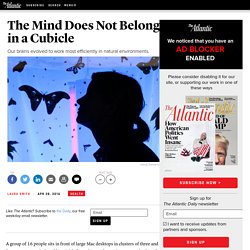
Aside from the steady tapping away at keyboards, there is little noise. It’s six o’clock, and people just want to go home. With its open floor plan, casual dress code, and creative staff, this is considered a great place to work—but still there is something vaguely dissatisfying about the space, and it is not the only office like this. In Cubed: A Secret History of the Workplace, released this week, Nikil Saval tries to put his finger on just where the office went wrong. Certainly an improvement on factory work and types of manual labor, the office remains “at once harmless and ominous.”
Near the end of Cubed, Saval takes a tour with a Google representative who shows him Google’s juice bar and tells him that it is the Googlers’ favorite hangout spot. Then, perhaps the reason office satisfaction proves elusive is because we don’t understand our primal biology. Special Lectures - GSA Annual Meeting 2013. Public Lecture | Gold Medal Lectures | Subaru Outdoor Life LectureLunchtime Lectures: SUN | MON | TUE | WED Public Lecture Saturday, 26 October, 2013, 2-3:30 p.m.
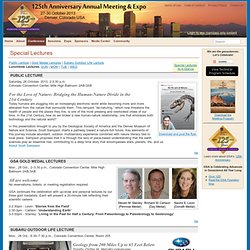
Colorado Convention Center, Mile High Ballroom 2AB/3AB For the Love of Nature: Bridging the Human-Nature Divide in the 21st Century Today humans are plugging into an increasingly electronic world while becoming more and more alienated from the nature that surrounds them. In this presentation brought to you by the Geological Society of America and the Denver Museum of Nature and Science, Scott Sampson charts a pathway toward a nature-rich future. Hide Bio Scott Sampson is a dinosaur paleontologist, evolutionary biologist, and science communicator. Top Mon., 28 Oct., 2–3:30 p.m., Colorado Convention Center, Mile High Ballroom 2AB/3AB All are welcome No reservations, tickets, or meeting registration required. The Geological Society of America. I-Tree Project Profile.
Wisconsin DNR's Northeast Regional Analysis Project The Wisconsin Department of Natural Resources' 2 Northeast Regional Urban Forestry Coordinators completed the final phase of a regional analysis of street trees and canopy cover for (19) communities in the Northeast Area of Wisconsin.
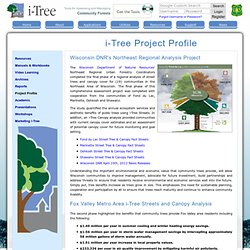
The final phase of this comprehensive assessment project was completed with cooperation from the communities of Fond du Lac, Marinette, Oshkosh and Shawano. Salud. The Los Angeles Times recently ran a feature article on the topic of child obesity in two cities in southern California [December 28, 2011].
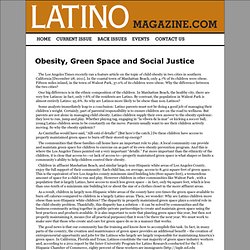
In the coastal town of Manhattan Beach, only 4.7% of its children were obese. Fifteen miles inland, in the town of Walnut Park, 37.0% of its children were obese. Why the difference between the two cities? One big difference is in the ethnic composition of the children. In Manhattan Beach, the healthy city, there are very few Latinos: in fact, only 7.6% of the residents are Latino. Some analysts immediately leap to a conclusion: Latino parents must not be doing a good job of managing their children’s weight. As Cantinflas would have said, “Allí está el detalle!” The communities that these families call home have an important role to play. As a result, children in largely non-Hispanic white areas of the county have 100 times the green space available to burn off calories compared to children in a largely Latino areas.
Www.cityprojectca.org/blog/wp-content/uploads/2009/04/stimulus-green-space-justice-200904294.pdf. Social and economic benefits of greenspace - Social and environmental justice. Deprived groups may experience differential access to greenspaces and associated services, which may be detrimental to their well-being.
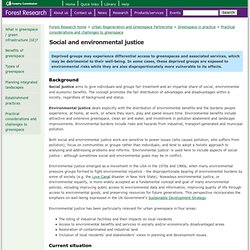
In some cases, these deprived groups are exposed to environmental risks while they are also disproportionately more vulnerable to its effects. Background Social justice aims to give individuals and groups fair treatment and an impartial share of social, environmental and economic benefits. The concept promotes the fair distribution of advantages and disadvantages within a society, regardless of background and status. Environmental justice deals explicitly with the distribution of environmental benefits and the burdens people experience, at home, at work, or where they learn, play and spend leisure time. Environmental justice has been particularly relevant for urban greenspace in four areas: Current situation ‘Environmental equality’ is a UK Framework Indicator and part of the UK Government’s Sustainable Development Strategy, Securing the Future (2005).
Preschool Outdoor Environment Measurement Scale POEMS. The objective of the instrument is to provide a valid, reliable tool for assessing the quality of outdoor environments and their use and at the same time provide guidance to childcare professionals and site administrators to assist them in making improvements.
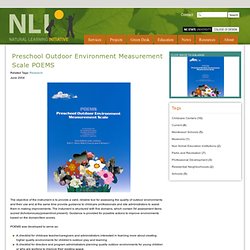
The instument is structured with five domains, which contain 54 assessment items scored dichotomously(present/not present). Guidance is provided for possible actions to improve environments based on the domain/item scores. POEMS was developed to serve as: Vm-jorum.ds.man.ac.uk/xmlui/bitstream/handle/10949/750/Items/prim_ey1_12t_3.pdf?sequence=11. Www.dimensionsfoundation.org/research/documents/SkillsLaCanadaCA_10.pdf.
Www.childrenandnature.org/downloads/CECCNNWorldwideResearch.pdf. Www.childrenandnature.org/downloads/C&NNReport_2010.pdf. Www.greenheartsinc.org/uploads/Green_Hearts_annotated_bibliography.pdf. Green Umbrella. The Ohio Leave No Child Inside Collaboratives: Every child needs unstructured play in nature. Every day. World Forum Foundation. Environmental Action Kit | Professional Collaborations | Universal Principles | Research | Resources | Advocacy Tools | Affiliate Tools | Early Childhood Program and Family ToolkitsThese are recommended and reviewed resources for connecting the World’s children with nature.
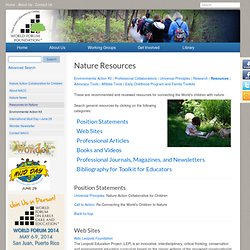
Search general resources by clicking on the following categories: Position Statements Web Sites Professional Articles Books and Videos Professional Journals, Magazines, and Newsletters Bibliography for Toolkit for Educators Position Statements Universal Principles: Nature Action Collaborative for Children Call to Action: Re-Connecting the World’s Children to Nature Back to top Web Sites Aldo Leopold Foundation The Leopold Education Project (LEP) is an innovative, interdisciplinary, critical thinking, conservation and environmental education curriculum based on the classic writings of the renowned conservationist, Aldo Leopold. Ccie-media.s3.amazonaws.com/nacc/wonder-213.pdf.